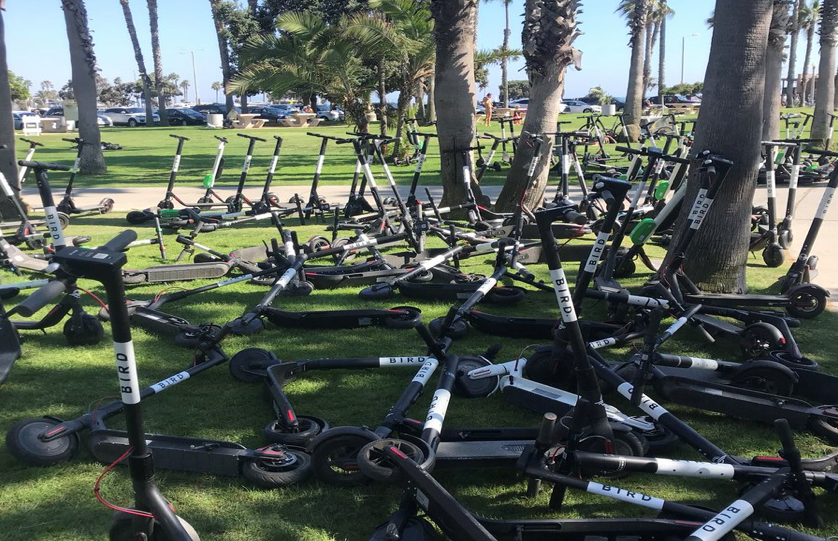CommentsDEEGAN ON LA-Not long ago, the bike community was demonized as interlopers who were taking over our roadways.
They seemed to inject a huge omnipresent dose of personality into their presence in the city. Not only were they bike-centric, they were aggressive about it, which may have cast them more as radicals than practical new urbanists in the eyes of traditionalists who rely on a carbon-fueled vehicle for mobility.
When new urbanists on bikes tried to show the rest of us how to be mobile without depending on a car, they faced criticism, a response from naysayers that could fall into the “future-phobic” category that Mayor Garcetti recently identified when speaking about his support for electric scooters, while also pointing out that they need regulation.
Now, years later when the anti-bike rhetoric has almost disappeared, and the streets are full of bikes coexisting with cars, a new form of mobility has suddenly appeared on our streets and sidewalks: electric scooters that some say are disrupting our communities.
Today, it’s the electric scooter community fighting for acceptance as part of the subset of alternative mobility that fits under the general classification known as “the new urbanism” -- a lifestyle that encourages people to work, live, shop and play within the same physical community. Any manifestation of this trend is a positive thing.
Electric scooters came out of nowhere, but have elicited comments from everywhere thanks to a chorus of “not-on-my-sidewalks” voices that has identified these cheap and readily available dockless scooters as the new devil. Policymakers in City Hall such as Mayor Garcetti, Councilmembers David Ryu (CD4) and Paul Koretz (CD5), as well as the Department of Transportation are all working to formulate regulations for this new mobility model that has been embraced by tons of new urbanists.
Some cities, notably West Hollywood and Santa Monica, have already taken strong measures to get a grip on the phenomenon. Los Angeles banned electric scooters several months ago, but enforcement has been nonexistent.
The politicos have gone back to the drawing board and are focusing on acceptance with regulation: how many and which vendors will get the permits to operate in the city, what to do about requiring helmets and driver licenses, and how to prohibit passengers on what is a flimsy machine that moves at 15 mph. Nobody is talking, yet, about repairing sidewalks where many scooters travel, or the need to prioritize foot traffic and respect for the handicapped on our sidewalks.
So far, the two most crucial words – “liability” (to the city if there’s no regulation), and “insurance” (for riders) -- are not part of the bigger conversation.
The challenge is getting past the identity politics swirling around who is and who is not a cyclist or a scooter-rider and jumping into the broader consideration of what it means to be a new urbanist.
The basics of New Urbanism are pretty simple and worth reiterating: it means preferring to live, work, shop and play in the same general area so you are not dependent on your car to get to these activities. New urbanism does not mean getting rid of your car, but rather, trying to minimize your dependence on it. Los Angeles is a collection of hundreds of neighborhoods with no central hub. While this has often been criticized, it actually reinforces the new urbanism dynamic by giving us so many local communities with the attributes that could fit the new urbanism model.
An argument in favor of scooters is their potential role in the transportation rubric of “first mile-last mile” (FLM) that describes the gap between where you live and your transit choice of subway, bus or train and how you get there. Do you walk, drive, bike, use a skateboard or now, use an e-scooter?
FLM is one of the arguments given to support increased housing near transit stops. It supposes that tenants occupying these new or repurposed units will be transit users. In a pure new urbanism paradigm, that would likely be true. But, housing costs must be factored in, which skews the FLM argument away from the doctrinaire dream that tenants in new towers near transit will automatically be FLM-types who utilize public transportation instead of cars.
What cannot be lost in the haze of scooter-ism, and how the public and politicos deal with this new phenomenon, is that we all need to find a way -- for a least a fraction of our daily lives -- to be a new urbanist. We can grow into it as a lifestyle, with or without a scooter.
(Tim Deegan is a civic activist whose DEEGAN ON LA weekly column about city planning, new urbanism, the environment, and the homeless appear in CityWatch. Tim can be reached at [email protected].) Edited for CityWatch by Linda Abrams.















